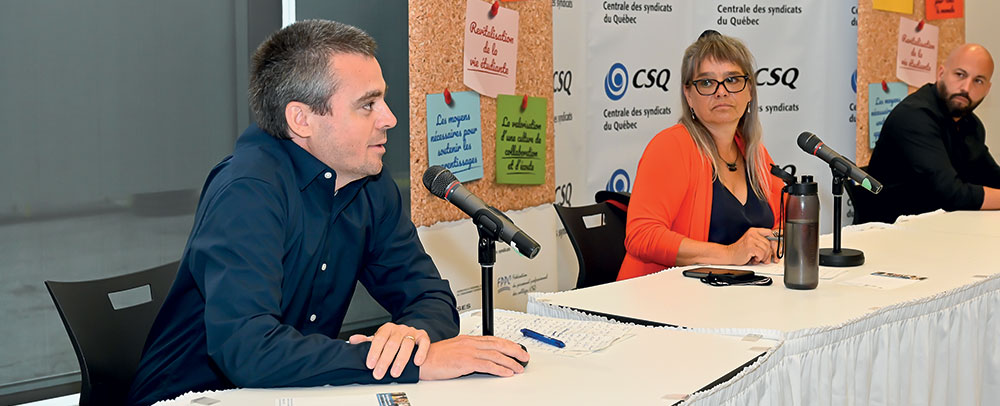The last months have been difficult as much for the students as for personnel. “The needs related to mental health exploded, but we had seen strong trends before the pandemic,” claims FPPC-CSQ1 president Éric Cyr. “Resources were already insufficient and we had serious professional personnel attraction and retention problems.”
FEC-CSQ2 president Lucie Piché adds that “the extent of the data reveals that we will be facing cohorts fragilized in their learning and in their journeys. We will need to motivate, supervise and support them more.”
Start fresh
The return to campuses is an opportunity to rethink ways of doing things to put the students’ and personnel’s wellbeing at the centre of concerns in cégeps and universities. “The next phase on our campuses shouldn’t be a step backward, a simple return to previous conditions. In many regards, those were already unacceptable and harmful to the workers’ and students’ wellbeing,” argues CSQ president Éric Gingras.
According to him, the pandemic forces us to stop and take note of the alarming problems that poison the working and studying environments. “Restarting must be the opportunity to do better,” he adds.
Five principles to follow
To ensure wellbeing on campus, the CSQ higher education federations—FEC-CSQ, FPSES-CSQ,3 FPPC-CSQ and FREUQ-CSQ4 —claim that five principles are vital to start fresh. We need:
- Human scale campuses;
- The necessary means to support learning;
- The dynamisation of student life;
- A real access to mental health services, for everyone;
- The valuing of a collaboration and listening culture.
“Human scale campuses are campuses where the participation of all is fully appreciated. For support personnel to contribute to everyone’s wellbeing, starting with the students, they must be given the means,” underlines FPSES-CSQ president Valérie Fontaine.
She adds that “the support personnel are competent and involved, and they know their environment well. They answered the call during the pandemic and will continue to do so if management chooses to show faith in them instead of calling on the private sector.”
Distance learning: not at any cost
To continue teaching during the pandemic, CEGEPS and universities put emergency measures in place, like distance learning, which allowed students to continue their learning.
In the college environment, space problems due to overpopulation now push some cégeps to want to continue distance learning to mitigate the lack of space. For Lucie Piché, “it’s unacceptable to compensate the lack of material resources by resorting to distance learning.”
For his part, FREUQ-CSQ president Vincent Beaucher estimates that if universities now want to promote distance learning, it has to be by injecting the necessary resources. “We most of all need to take the time to discuss it, notably with the lecturers and training officers, who are often completely overlooked, so that the decisions are made in collaboration.”
In short, “it’s urgent that the government’s announcements translate into concrete improvements on the ground,” concludes Éric Cyr.

1 Fédération du personnel professionnel des collèges.
2 Fédération des enseignantes et enseignants de cégep.
3 Fédération du personnel de soutien de l’enseignement supérieur.
4 Fédération de la recherche et de l’enseignement universitaire du Québec.
